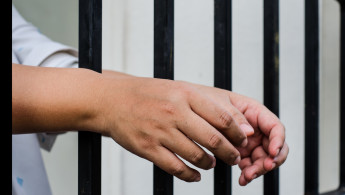Yemen govt, Houthis 'must free women held post-jail term' over lack of male guardian
Amnesty International on Wednesday called on Yemen's government and Houthi rebels to free women who are held after they finish their jail terms have been completed because they have no male guardian to release them to.
The rights group said prison authorities across Yemen continue to keep women behind bars on these grounds.
Releasing imprisoned women only if they have a male guardian's approval is a customary practice that long predates Yemen's war which started in 2015, Amnesty said.
Amnesty's deputy Middle East director Grazia Careccia said: "It is unacceptable that authorities in Yemen still view and treat women as incomplete individuals, with no agency and who need to be accompanied by male guardians in day-to-day lives.
"Customary traditions must evolve, like societies do, to ensure that human rights and dignity are respected.
"They should end unjustifiable deprivation of liberty and all forms of gender-based discrimination."
An ex-prison official who worked at a jail run by the Houthis in the capital Sanaa gave examples, including the case of a woman who had been held arbitrarily for five years after finishing her sentence.
The official said there was also a woman "released to her father in 2019 only to be killed by him a week later".
Another woman who spoke to Amnesty finished a jail sentence in Taiz central prison last year, but was sent to a women's shelter because she didn't have a male guardian to accompany her from jail.
She had been raped in 2021 in her home while her husband and children were away. She was then accused of and reported for adultery by her in-laws.
Multiple factors have thus far enabled Oman-led mediation to de-escalate the conflict in Yemen. However, the ongoing peace progress is not guaranteed to bring an era of stability to the country. 👇
— The New Arab (@The_NewArab) January 25, 2023
✍ Khalid Al-Karimi https://t.co/4PRdSiBkO1
She said: "I was jailed for being raped. I was released to the shelter because my husband divorced me, and my family wouldn't take me back.
"I feel oppressed and deeply sad. I lost my children, my husband, and my family abandoned me. I am depressed.
"I had nowhere to turn to but the shelter. I hope I will build a new life and find work after I leave the shelter."
Two Yemeni lawyers told Amnesty the release practice stems from social norms rather than legal provisions.
"The law prohibits detention following the completion of sentence regardless of the gender of the individual," one lawyer said.
"We need community pressure from organisations and activists to end this practice."





 Follow the Middle East's top stories in English at The New Arab on Google News
Follow the Middle East's top stories in English at The New Arab on Google News


